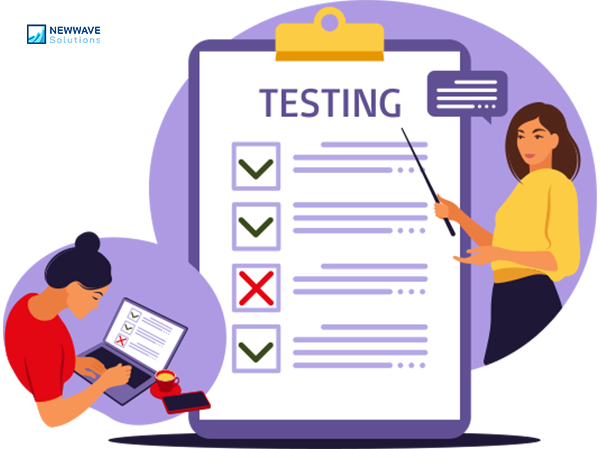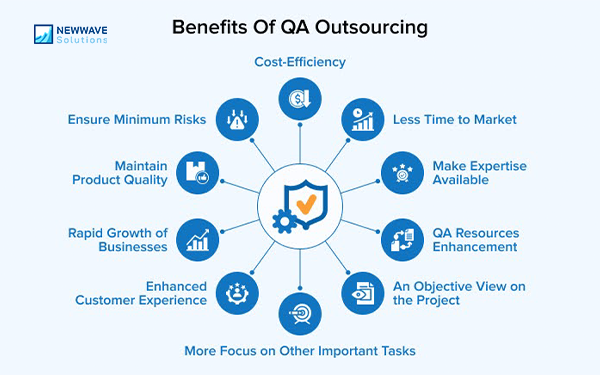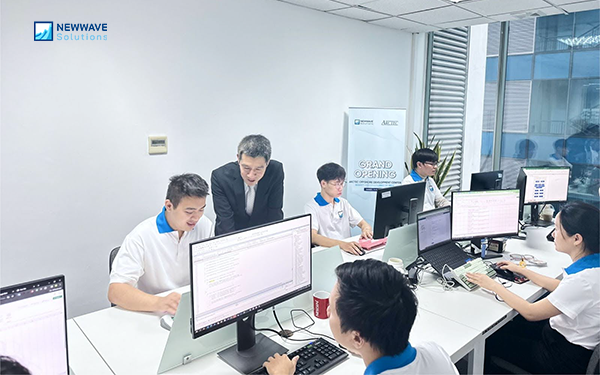Top 10 Powerful Offshore QA and Testing Services to Support Business Growth

In today’s fast-evolving software world, offshore QA and testing services provide a key advantage. They leverage global expertise to ensure high-quality software and cost efficiency. This article explores the benefits, challenges, and best practices for managing these specialized offshore teams.
1. What are Offshore QA and Testing Services?
Offshore QA and testing services involve outsourcing the quality assurance and testing of software to specialized teams located outside your home country. These offshore QA and testing services, often provided through an offshore software testing centre, leverage global expertise, cost efficiency, and advanced methodologies to ensure superior results.
Offshore software development services involve outsourcing software development tasks to teams located in different countries. These teams specialize in various aspects of development, from coding to offshore QA and testing services, providing businesses access to a global talent pool and expertise.

Engaging in offshore QA means tapping into a broad talent pool to enhance your software’s quality. Offshore QA and testing services typically include various testing methodologies such as manual testing, automated testing, performance testing, security testing, and usability testing. These offshore software testing services are crucial for identifying and addressing potential issues before your software reaches end-users, ensuring it meets both functional and non-functional requirements.
1.1. Importance of Quality Assurance in Software Development
Quality assurance (QA) is essential in the software development lifecycle. It involves rigorous processes to guarantee that software products meet required standards and are devoid of defects. Effective QA practices are pivotal as they influence customer satisfaction, brand reputation, high quality, and overall business success.
Implementing robust QA practices minimizes post-release bugs, reduces maintenance costs, and enhances user experience. Furthermore, a well-structured QA process ensures compliance with industry standards and regulations, mitigating legal risks. In the competitive software landscape, high-quality output is indispensable for maintaining a strong market position. Teams that integrate offshore QA and testing services early save 22% on issue resolution and deploy code 200 times more often, keeping products competitive and users satisfied.
For businesses considering offshore solutions, exploring offshore QA and testing services can be a strategic move. By hire offshore QA team, companies gain access to specialized expertise and can streamline their software development process, achieving high standards of quality while managing costs efficiently.
2. Benefits of Offshore QA and Testing Services
When considering offshore QA and testing services, the allure of cost savings often stands out. However, the benefits of outsourcing your QA needs extend far beyond just reducing expenses. Here’s why offshore QA expertise can be a game-changer for your software projects.

2.1. Cost-Effectiveness
The primary draw of offshore QA testing is cost efficiency. By leveraging offshore QA and testing services, you benefit from significantly lower labor costs compared to North America or Western Europe. Moreover, offshore QA providers handle overheads like office space, benefits, and taxes, ensuring you only pay for the project and your team’s salaries, without any hidden costs.
2.2. Strategic Partnership
Opting for offshore QA and testing services fosters valuable long-term partnerships at a fraction of the cost of an in-house team. Offshore QA teams often become integral to your development process, offering reliable insights and taking full responsibility for your product’s quality. Unlike freelancers, these dedicated teams are committed and embedded in your project, ensuring consistency and reliability.
2.3. Enhanced Software Quality
The ultimate goal of software testing is to ensure the highest quality of your application. Offshore testing teams focus exclusively on your product’s quality, employing comprehensive approaches to maintain high standards. Their external perspective helps avoid biases and ensures an objective evaluation of your software.
2.4. Access to a Larger Talent Pool
Finding specialized QA talent locally can be challenging and costly. Offshore QA services provide access to a broad talent pool with specific industry or technical expertise, often not available or affordable in your local market. This flexibility allows you to hire the right experts for your project without geographical constraints.

2.5. Faster Releases
In a competitive landscape, quick turnaround times are crucial. Offshore QA and testing services can expedite your release schedule by working in different time zones, enabling round-the-clock testing. This means your software can be tested and released faster, giving you a competitive edge.
2.6. Government Support
Regions like Southeast Asia and Eastern Europe offer robust government support for offshore QA and testing. From favorable taxation policies to comprehensive legal support, these regions strive to attract Western companies, providing an advantageous environment for your QA needs.
2.7. Absolute Flexibility
Offshore QA and testing services offer unmatched flexibility compared to traditional in-house hiring. You can choose from various cooperation models, such as fixed cost, time and material, or dedicated team. This flexibility allows you to scale the team and adjust the offshore QA and testing services according to your project’s needs, ensuring a tailored approach to your testing requirements.
2.8. Robust Documentation
Effective offshore QA and testing services prioritize thorough documentation. Offshore QA teams maintain detailed records of their testing processes and results, ensuring clarity on whether your software meets all functional and non-functional requirements. This robust documentation helps prevent miscommunication and ensures transparency throughout the testing phase.
Leveraging offshore QA and testing services can significantly enhance your software development process, providing cost-effective solutions, strategic benefits, and access to global expertise.
3. Challenges in Offshore QA Testing
Offshore QA and testing services, like many global solutions, come with their own set of pros and cons. We’ve previously highlighted the benefits of these services; now, let’s delve into the common challenges associated with offshore QA testing.

3.1. Time Zone Differences
Time zone differences can be both a benefit and a challenge. When offshore QA teams work alongside onshore teams, they enable nearly round-the-clock testing. However, with exclusive offshore reliance, a 9 to 13-hour difference can limit real-time communication. Adopting asynchronous methods and flexible working hours can help mitigate this issue.
3.2. Cultural and Language Barriers
Working with offshore teams involves navigating cultural and language differences. While many teams invest in English training, communication barriers can still exist. Cultural discrepancies in deadlines and work ethics may arise, but a dedicated project manager can address these through effective communication and understanding.
For example, TestFort’s team spread across Eastern and Central Europe, communicates well in English. Their UK-based Head of Delivery, Bruce Mason, bridges cultural gaps, ensuring smooth client interactions and compliance with local practices. To mitigate these challenges, it’s essential to hire an offshore QA team with expertise in managing cultural differences and utilizing offshore testing & inspection services effectively.
3.3. Managing Remote Teams Effectively
The quality of offshore QA services varies. Choosing a low-cost offshore software testing company without thorough vetting can result in subpar work and hidden costs for additional teams to address missed issues. Opting for a well-reviewed provider helps ensure high-quality outcomes.
4. Top 10 Types of Offshore QA and Testing Services
In the realm of software development, navigating the diverse types of QA testing can be overwhelming. Whether you’re familiar with some testing methods or new to them, understanding their roles is crucial for ensuring high-quality software. Here’s a detailed look at the top 10 types of QA testing and how they contribute to overall product excellence.
|
Type of Testing |
Description |
Relevance to Offshore QA & Testing |
|
Unit Testing |
Focuses on individual units or functions to ensure each component meets predefined standards early in the development cycle. |
Essential for offshore QA teams to catch issues in isolated parts of the code quickly. |
|
Component Testing |
Tests multiple units or components together using real data to identify defects before integration. | Helps offshore QA services ensure components work correctly before they are integrated. |
|
Integration Testing |
Verifies that different modules or services work together as expected when combined. | Crucial for offshore QA expertise to ensure that various parts of the system function well together. |
|
End-to-End Testing |
Simulates real-world scenarios to test the overall functionality and performance of the product. | Used by offshore QA testing to verify data integrity and user flow in a live environment. |
|
Performance Testing |
Evaluates system behavior under different load conditions to ensure reliability and stability. | Important for offshore QA services to confirm that the application can handle high traffic effectively. |
|
Regression Testing |
Tests the software after changes to ensure existing functionalities remain unaffected. | Applied by offshore QA teams to maintain software quality through updates and modifications. |
|
Sanity Testing |
Check if recent code changes or new features are stable enough for further testing. | Helps offshore QA services identify build stability and prevent further testing on unstable systems. |
|
System Testing |
Assesses how all components work together as a complete system based on overall requirements. | Conducted by offshore QA teams to ensure the integrated system meets all specified requirements. |
|
Smoke Testing |
Performs basic checks to ensure major features are functioning correctly after new builds. | Used by offshore testing services to quickly determine if more extensive tests are needed. |
|
User Acceptance Testing (UAT) |
Evaluate if the software meets real-world needs and business requirements by replicating user behavior. | Conducted by offshore QA and testing services to confirm the product is ready for end-users and meets business needs. |
This table provides a concise overview of different types of QA testing and their relevance to offshore QA and testing services. By incorporating these methods, you can enhance software quality and ensure a reliable final product.
5. How to Choose the Right Offshore QA and Testing Services
Selecting the ideal offshore QA and testing services partner is crucial for ensuring your software’s quality. Whether you’re seeking a short-term solution or a long-term collaboration, the choice of an offshore QA team can significantly impact your project’s success. Here’s a refined guide to help you make an informed decision.

5.1. Define Requirements
Clearly outline your testing needs, project scope, and desired outcomes to ensure effective communication with your potential offshore QA team members. By establishing these details from the start, you can align expectations and ensure that everyone involved is on the same page regarding objectives and deliverables.
5.2. Research Skills
Assess the expertise and tools of offshore QA providers. Ensure they have a proven track record in the types of testing you require and are familiar with the latest industry trends. This helps to ensure they are well-equipped to meet your project’s needs and can adapt to any technological advancements in the field.
5.3. Review Portfolio
Examine the provider’s project portfolio to gain insight into their experience across various industries and their ability to handle different project requirements. A strong portfolio shows versatility and expertise, indicating that they can deliver quality results for your specific project.
5.4. Discuss Cooperation
Ensure open and transparent communication about project management methodologies, communication channels, and reporting structures. This will help establish a collaborative and efficient working relationship, ensuring smooth progress throughout the project.
5.5. Check Communication Practices
Evaluate the tools and methods used by the offshore QA provider to ensure they are capable of working effectively across different time zones and overcoming potential cultural barriers. Clear communication is crucial for avoiding misunderstandings and maintaining project timelines.
5.6. Consider Time Zones and Language
Assess how time zone differences and language proficiency could affect collaboration and project timelines. Understanding these factors will help you plan for potential delays and ensure smooth coordination, particularly when urgent decisions or feedback are required.
5.7. Evaluate Work Ethic
Look for a provider that demonstrates a strong commitment to quality, deadlines, and professionalism. A dedicated offshore QA team should be focused on delivering high standards, promoting continuous improvement, and taking ownership of their responsibilities to ensure project success.
By carefully considering these factors, you can select an offshore QA service that aligns with your project needs and ensures successful outcomes.
6. 5 Tips to Make the Most of Your Offshore Testing Team
When engaging offshore QA and testing services, the selection of a vendor and team composition are critical. However, to ensure that your offshore QA team delivers exceptional quality, effective ongoing management is key. Here’s how to maximize the benefits of your offshore QA expertise:

6.1. Know Your QA Team’s Strengths
Understand your offshore QA team’s skills and backgrounds to leverage their strengths. Foster a positive environment with virtual coffee breaks and team-building activities to enhance collaboration.
6.2. Communicate Clearly and Manage Language Barriers
Provide clear instructions and use simple language to avoid misunderstandings. Encourage open dialogue and regular updates to keep everyone aligned.
6.3. Balance Onshore and Offshore Efforts
Find the right mix of onshore and offshore work. Schedule regular meetings to discuss updates and challenges, and ensure fair workload distribution to prevent burnout.
6.4. Adapt Issue Management
Tailor your issue management process for remote teams. Use a centralized tracking system for efficient communication and encourage early problem identification and resolution.
6.5. Document Deliverables Properly
Ensure detailed documentation of test cases, results, and recommendations. This transparency aids future projects and facilitates knowledge transfer, ensuring long-term success for your offshore testing center collaboration.
By effectively managing these aspects, you can enhance the performance of your offshore QA team and achieve high-quality software outcomes.
7. Factors Determining Offshore QA and Testing Services Cost
7.1. Testing Process Review
Taking the time to assess the testing process helps spot inefficiencies and areas for improvement. Streamlining the process not only makes it more effective but also helps cut down on unnecessary costs.
7.1. Testing Process Review
Taking the time to assess the testing process helps spot inefficiencies and areas for improvement. Streamlining the process not only makes it more effective but also helps cut down on unnecessary costs.
7.2. Testing Approach
The way you plan, design, and execute your tests plays a big role in cost. A well-thought-out strategy that catches problems early on can save you from expensive fixes down the line.
7.3. Test Environment Setup
A properly configured test environment is key to smooth testing. If you don’t have everything set up right, it can lead to delays and extra costs. Good offshore QA and testing services will help ensure everything runs efficiently.
7.4. Planning and Design Complexity
How complex your project is will directly impact your offshore QA and testing services costs. The more intricate the design and the longer the testing process, the higher the costs are likely to be.
7.5. Testing Team Costs
The experience and size of the testing team can affect your budget. While hiring a skilled team might cost more, it’s an investment in quality. The size of the team also depends on how complicated your software is.
7.6. Debugging Time
Finding and fixing bugs takes time. The more defects found during testing, the more effort is required to fix them, which means higher costs for the whole offshore QA and testing services process.
8. Frequently Asked Questions
#1 What types of testing should be outsourced?
Organizations often choose to outsource various types of testing, including manual testing, automated testing, performance testing, security testing, and usability testing. The decision to outsource specific testing functions depends on factors such as project complexity, budget constraints, and the availability of in-house expertise.
Outsourcing testing can be particularly beneficial for repetitive tasks, large-scale projects, or specialized testing areas where external expertise is required. By leveraging offshore QA services, organizations can enhance their testing capabilities and improve overall software quality.
#2 How to measure the success of offshore QA initiatives?
Measuring the success of offshore QA initiatives involves evaluating various metrics and key performance indicators (KPIs). Common metrics include defect density, test coverage, test execution time, and customer satisfaction ratings. By tracking these metrics, organizations can assess the effectiveness of their offshore QA facility, efforts and identify areas for improvement.
Additionally, conducting regular reviews and feedback sessions with the offshore team can provide valuable insights into the quality of work produced and the overall collaboration experience. This ongoing evaluation process is essential for driving continuous improvement and ensuring alignment with project goals.
#3 What tools are commonly used in offshore QA testing?
Offshore QA teams utilize a variety of tools and technologies to facilitate testing processes. Commonly used tools include test management systems, automated testing frameworks, performance testing tools, test automation, and bug-tracking software. Some popular tools in the industry include Selenium, JIRA, TestRail, LoadRunner, and Postman.
When selecting an offshore QA service provider, it is essential to inquire about the tools and technologies they use. A provider that employs industry-standard tools and practices will be better equipped to deliver high-quality results and ensure efficient testing processes.
9. Conclusion
Offshore QA and testing services offer significant benefits for enhancing software quality and reducing costs. By leveraging offshore QA expertise and accessing a global talent pool, businesses can refine their testing processes and deliver high-quality products. Effective offshore collaboration requires careful planning and clear communication.
Choosing the right offshore QA partner and adhering to best practices can maximize the value of offshore testing services. Newwave Solutions provides top-notch offshore QA and testing services with rigorously vetted professionals, ensuring exceptional software quality and efficiency.
Contact Information:
- Head Office (Hanoi): 1F, 4F, 10F, Mitec Building, Duong Dinh Nghe Street, Yen Hoa Ward, Cau Giay District, Hanoi City, Vietnam
- Branch Office (Tokyo): 1chōme118 Yushima, Bunkyo City, Tokyo 1130034, Japan
- Hotline: +84 985310203
- Website: https://newwavesolution.com
- Email: [email protected]
To Quang Duy is the CEO of Newwave Solutions, a leading Vietnamese software company. He is recognized as a standout technology consultant. Connect with him on LinkedIn and Twitter.

Read More Guides
Get stories in your inbox twice a month.
Let’s Connect
Let us know what you need, and out professionals will collaborate with you to find a solution that enables growth.




Leave a Reply